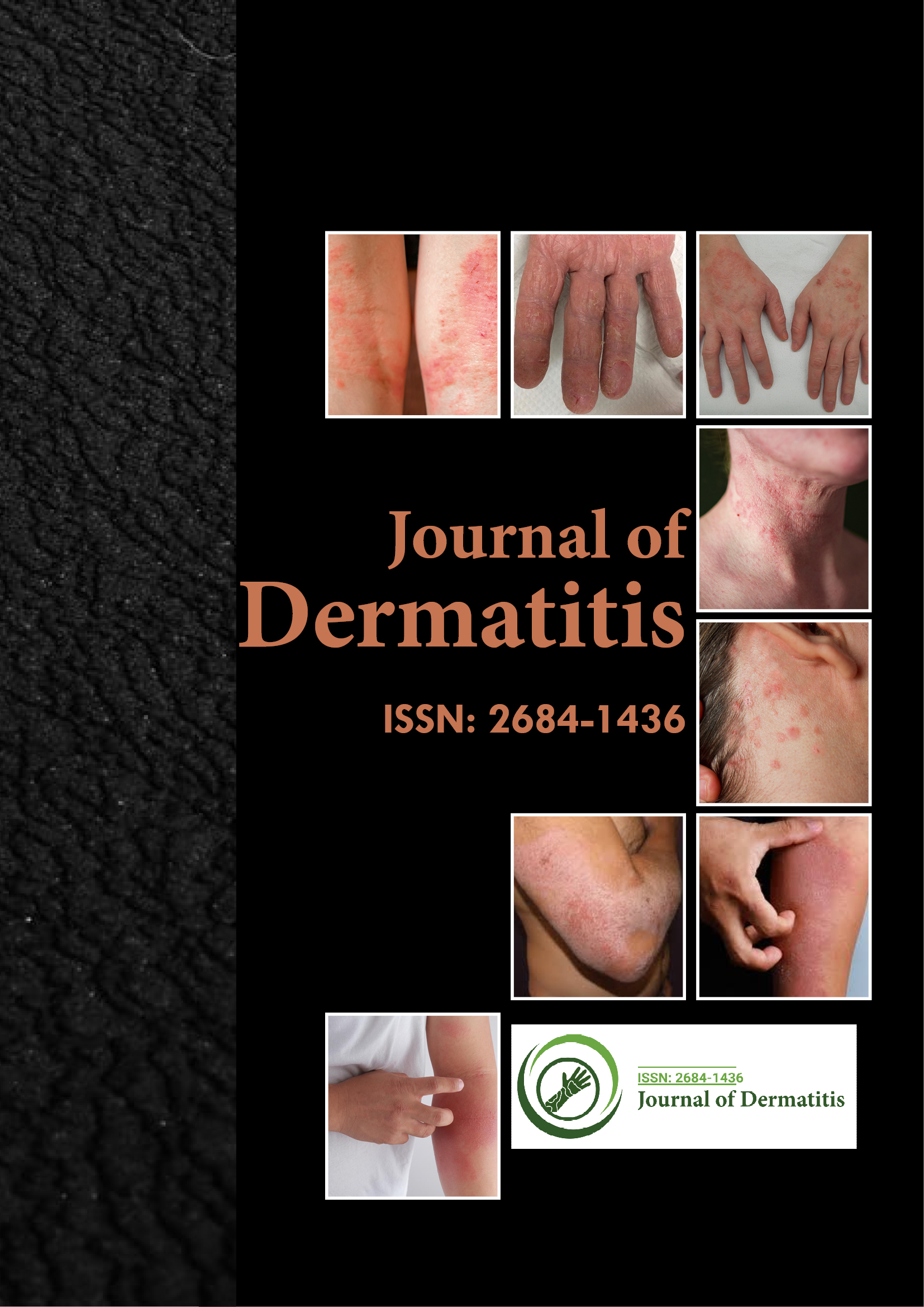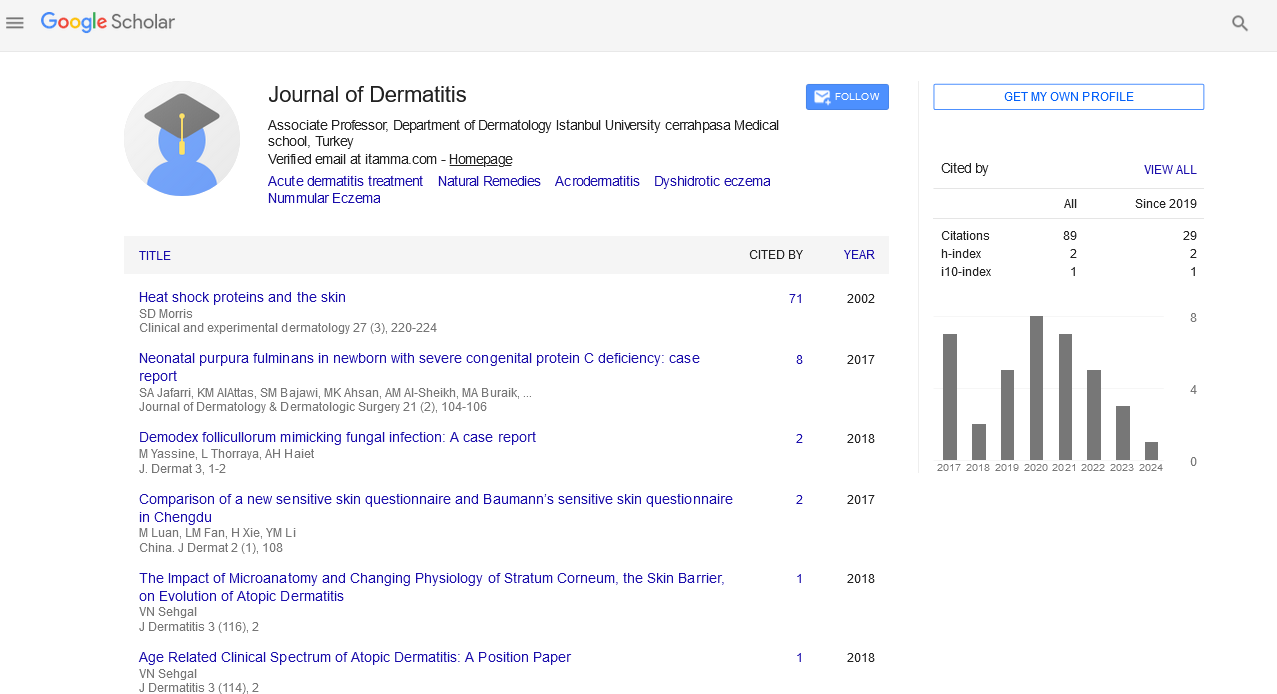Indexed In
- RefSeek
- Hamdard University
- EBSCO A-Z
- Euro Pub
- Google Scholar
Useful Links
Share This Page
Journal Flyer

Open Access Journals
- Agri and Aquaculture
- Biochemistry
- Bioinformatics & Systems Biology
- Business & Management
- Chemistry
- Clinical Sciences
- Engineering
- Food & Nutrition
- General Science
- Genetics & Molecular Biology
- Immunology & Microbiology
- Medical Sciences
- Neuroscience & Psychology
- Nursing & Health Care
- Pharmaceutical Sciences
Opinion Article - (2023) Volume 8, Issue 4
Management of Psoriasis and its Regulation by Ecological Conditions
Olveira Crespo*Received: 19-Jul-2023, Manuscript No. JOD-23-22373; Editor assigned: 21-Jul-2023, Pre QC No. JOD-23-22373 (PQ); Reviewed: 07-Aug-2023, QC No. JOD-23-22373; Revised: 14-Aug-2023, Manuscript No. JOD-23-22373 (R); Published: 21-Aug-2023, DOI: 10.35248/2684-1436.23.8.207
Description
Psoriasis is a chronic autoimmune skin condition that, causing discomfort, pain, and a significant impact on the life. It is characterized by the rapid buildup of skin cells, leading to the formation of red, itchy, and scaly patches on the skin's surface. Despite the prevalence and severity of this disease, the regulation of psoriasis remains a complex and dynamic process that researchers and medical professionals are continuously striving to comprehend.
At the core of psoriasis lies an intricate interplay between the immune system, genetics, and environmental factors. The immune system plays a critical role in protecting the body from foreign invaders, but in individuals with psoriasis, it mistakenly identifies healthy skin cells as threats, triggering an immune response. This results in the production of cytokines, which are signaling molecules that further fuel inflammation and cause the skin cells to multiply rapidly. One of the key cytokines involved in psoriasis is Tumor Necrosis Factor-Alpha (TNF-alpha), which is responsible for the characteristic redness and swelling observed in affected areas.
Genetics also plays a significant role in the regulation of psoriasis. The most well-known genetic factor is the Human Leukocyte Antigen (HLA) complex, particularly HLA-Cw6, which is found to be present in a higher percentage of psoriasis patients compared to the general population. However, having these genetic markers does not covenant that an individual will develop psoriasis, as other factors, such as environmental triggers.
Environmental triggers can vary widely and may include stress, infections, certain medications, and lifestyle choices like smoking and excessive alcohol consumption. Stress, in particular, has been linked to exacerbating psoriasis symptoms due to its impact on the immune system and inflammatory responses. Moreover, certain infections, such as streptococcal infections, can trigger psoriasis flares in susceptible individuals.
The regulation of psoriasis involves a multi-faceted approach that aims to alleviate symptoms, prevent flare-ups, and manage the condition effectively. Topical treatments, such as corticosteroids and vitamin D analogs, are commonly used to reduce inflammation and control psoriasis plaques. Phototherapy, or light therapy, is another option that utilizes ultraviolet light to slow down the rapid skin cell growth. For severe cases, systemic treatments like oral or injected medications may be prescribed to target specific components of the immune system, such as TNFalpha or interleukins.
In recent years, advances in biotechnology have led to the development of targeted biologic therapies for psoriasis. These drugs are designed to interfere with specific immune pathways responsible for the disease's progression.
Furthermore, lifestyle modifications can complement medical treatments in regulating psoriasis. Maintaining a healthy diet, exercising regularly, and avoiding known triggers can help reduce the frequency and severity of psoriasis flares. Managing stress through relaxation techniques, mindfulness, and counseling can also contribute to better disease control.
In conclusion, the regulation of psoriasis is a multifaceted process that involves the intricate interplay of the immune system, genetics, and environmental factors. Researchers and medical professionals continue to explore the complex mechanisms underlying this chronic skin condition. With ongoing advancements in treatment options and a holistic approach to management, individuals living with psoriasis can find relief and a better life.
Citation: Crespo O (2023) Management of Psoriasis and its Regulation by Ecological Conditions. J Dermatitis. 8:207.
Copyright: © 2023 Crespo O. This is an open-access article distributed under the terms of the Creative Commons Attribution License, which permits unrestricted use, distribution, and reproduction in any medium, provided the original author and source are credited.

